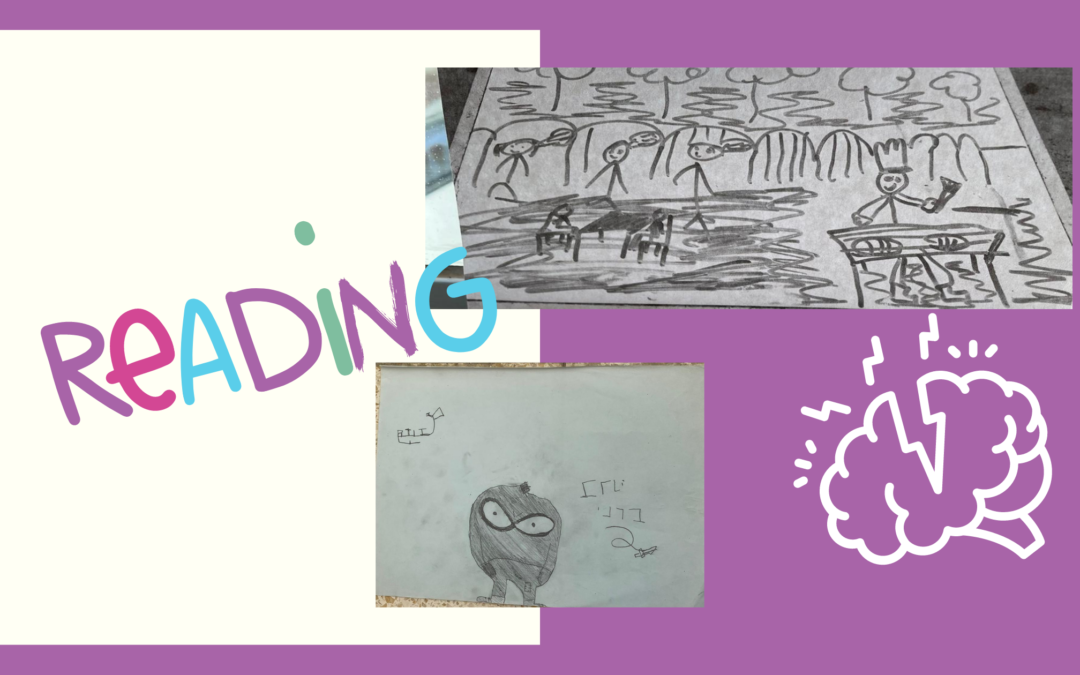What is the connection between stress and reading, between our emotional state and our ability to read? Can children read as soon as they know how to recognize letters and read syllables? Stress and anxiety have a huge impact on our cognitive achievements, and they can very quickly change us from functioning pupils to dysfunctional students. As a teacher, part of my attention goes into teaching the child to let go of stress. Only then, when the child feels more relaxed, can we focus on the reading.
Often, pupils get stressed in exams, and then even students who know the material might fail. When teaching children to read, some physical exercises are added, to ensure their feeling of security and calmness. Stress and reading are not a great match, and it is crucial to make sure that the pupil is not stressed when teaching them to read.
Miracles or Process
If you read Elis’s story, you might remember how he changed his perception from a child who could not read to one that could read already after one lesson. His teacher was amazed at his reading ability- walking in as a non-reading student and walking out as a student reading almost at his age level. She immediately wrote to the school principal, advisor, and staff about what had occurred.
The next day, he came full of motivation to school to show everyone his newly gained skill. He was called into the room where the principal, advisor, and teachers were waiting. A book was put in front of him. To everyone’s disappointment, he went back to stage one of not being able to read one word! Stress and reading, you already guessed correctly, are not a good match.
Joy vs. Stress
Excitement turned into stress, and stress overtook his happiness. Joy is a positive element in our bodies, and stress quickly turns the positive into the negative. Again, the words that overcame him were “I cannot, I am a failure, etc. stress and reading joined together, and his reading went back to what it was before he came into the magical space of calm emotions and an ability of “I can read.” The teacher felt bad for him as well as for the staff who were full of anticipation. Of course, there was an atmosphere of overall disappointment.
Disappointment influences the way we react. Eli was angry and frustrated once again, and everything slid back into his inability to read even one word. When the teacher called to tell me about the incident, I felt my heart shouting- why on earth was he put into such a stressful situation? Why not let him learn to enjoy reading before asking him to perform in front of his teachers?
Negative decision making
Don’t put a pupil into a stressful situation, surrounded by grownups in a place where he had been a failure for so many years. In a situation like this, a student would need the confidence of a super-star to prove his abilities. The truth is that you, as an adult would need the same confidence to perform. Success is not something you achieve in one moment, it is an attitude and it results from many moments of doing and an inner feeling of achievement.
Discussing the situation with his teacher I explained that by putting him under the limelight in such a way, he was brought back into the same negative attitude, of being tested, and the feeling of failure is still very much in his memory and body. The knowledge that he cannot read is sadly very stressful and knowing that the only place he managed so far to read was when he was with me, this knowledge and feeling of achievement was still new and not fixed in his mind. The challenge now would be not only to teach him to read but, more importantly, to let him read in his classroom or at home. To teach him that reading is a joyful activity and HE COULD DO IT!
How to bring success into the classroom?
When the teacher called me for support, I guided her on separating between stress and reading. In other words, how to diminish stress. Firstly, I recommended changing the venue. Find a space that has no memory of failure. Let Eli even sit outside under a tree. It does not have to be a classroom situation, and it should be a place where he feels safe and unthreatened.
Remind him of the feeling of success. Ask him to think back to how excited he was when he could read and what a wonderful feeling it was to succeed. I asked his teacher to instruct him to tell himself that he could do it again, and if he managed once, there is no reason it cannot occur again.
Unlinking the stress from reading makes for a better start. I asked her to read him the first sentence or two, and then ask him to repeat, helping him get back his confidence and familiarity with the words once again and even sharing with him what he is about to read on the page so the reading would flow easier.
The teacher tried this, and it worked. He started reading once again – not as fluently as he did in the clinic surroundings. I explained to the teacher that school has its energies and influences on us all, and in a new environment, there are less stressful forces playing on our emotions. I was surprised to understand that such basic knowledge about the connection between stress and reading was missing, and I wondered how many pupils fail only because no one notices how stressed they are.
Stress plays a big part in the failure
Many things are stressful for a student who has difficulties—comparing himself to his friends who can manage everything easily—not understanding the method that is being taught. Not being able to go out of the classroom when he feels he needs a break. Not being accepted by others in the classroom. Not knowing what to do when he loses his concentration. This is just part of a list of things that are stressful and have a huge influence on the way we learn.
Negative emotions are a serious enemy in a time of trying to prove success to ourselves. If a child feels negative emotions, stress and difficulty in reading will link together, and we must find a way to guide the child toward the positive and let energies flow in the direction of hope and success.
It is essential, as a teacher, to take into account the child’s settings at their homes or school, as it might be that the place that was supposed to teach, in this case- the school, is one of the sources of feeling failure. In Eli’s case, it is important to note that the school’s intentions were trying to reach out to him and help. They did and still do make a major effort to teach him, including the teacher that comes to every lesson with him, the money the parents raised so he could come to private lessons, and the love and attention they direct at him. Now I am sure that they will learn how to invest their energies in a stress-free environment and have no doubt that Eli will be a reading student very soon and they will be proud of his and their achievements.





